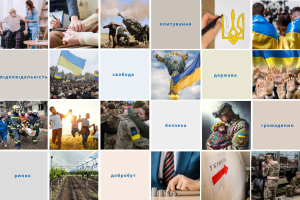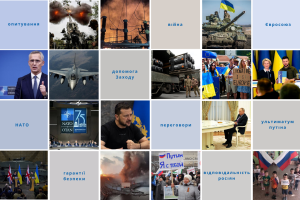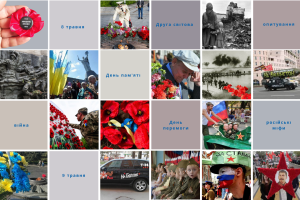The survey was conducted by Ilko Kucheriv Democratic Initiatives Foundation together with Razumkov Center Sociological Service under support of MATRA Program from December 13 to December 21, 2022.
The survey was conducted using face-to-face method in the following regions:
- Volyn, Zakarpattia, Ivano-Frankivsk, Lviv, Rivne, Ternopil, Chernivtsi regions (Western macro region);
- Vinnytsia, Zhytomyr, Kyiv, Kirovograd, Poltava, Sumy, Khmelnytskyi, Cherkasy, Chernihiv regions and in Kyiv city (Central macro region);
- Mykolaiv, Kherson and Odesa regions (Southern macro region);
- Dnipropetrovsk, Zaporizhzhia, Kharkiv regions (Eastern macro region)
The survey was conducted usiNG a stratified multi-stage sample. The structure of the sample population reflects the demographic structure of the adult population on the territories where the survey was conducted, as of the beginning of 2022 (by age, gender, type of settlement).
2018 respondents of the age of 18 and older have been interviewed. The theoretical sampling error does not exceed 2.3%. However, additional systematic deviations of the sample can be caused by the consequences of Russian aggression, in particular, forced evacuation of millions of citizens.
Main research findings
The language situation in Ukraine
- In 2022, the share of citizens who use Ukrainian in everyday life increased compared to 2021. While in 2021 this figure was 64%, in 2022 it rose to 71%. At the same time, the use of the Russian language has decreased by almost 10%. This dynamic is the result of both the effect of symbolic rejection and the impossibility of conducting public opinion polls in the occupied and frontline territories of the South and East of Ukraine.
Russian remains the widely spoken language in everyday communication in the Southern and Eastern macro-regions. At the same time, it should be noted that language use is not limited to communication in the family or with close friends. It is likely that a significant share of those who indicated Russian as their preferred language of communication at home use Ukrainian in the public sphere, when communicating with a Ukrainian-speaking counterpart, etc.
There are also differences in the language practices of residents of different types of settlements. In particular, as it was previously the case, Russian is widespread in the cities of the South and East of Ukraine, while residents of villages and towns are mostly Ukrainian-speaking.
- The share of people who consider Ukrainian their native language has also increased. While in 2021, 77% of Ukrainians considered Ukrainian to be their native language, this figure rose to 87% over the year. At the same time, Ukrainian language identity prevails in all regions of Ukraine.
The issue of the correlation between language identity and language practice remains relevant. Part of the citizens of Ukraine who consider Ukrainian to be their native language speak Russian at home. This is particularly prevalent in the South and East of the country, where almost 40% of Ukrainians who consider Ukrainian their native language mostly speak Russian at home..
Should Russian writers be removed from the Ukrainian school syllabus?
- There is a clear trend in public opinion towards a decrease in the perceived importance of Russian writers in the school syllabus. Slightly more than a third of Ukrainians (38%) believe that Russian authors should not be taught in Ukrainian schools at all. This opinion is most widespread in the West of the country, and the least supporters of a complete rejection of Russian "content" in Russian school syllabus are in the South. Only about 7% of citizens still support the continuation of studying the Russian authors in the previous volume and manner. The rest are in favour of reducing the number of Russians in textbooks, but still the option of keeping studying the works that are considered "world classics" remains relatively popular (about 28%).
The younger the respondents, the less they want to see Russians in the school education programmes. Among the youngest age group, 46% support excluding Russian authors, while the "Russophobia" of the oldest generation is somewhat lower - about 33%.
Ukrainians' Attitudes to Russian and Russian-language Cultural Products
Before the full-scale Russian invasion, about 41% of Ukrainians consumed Russian cultural products frequently. The highest number of people who admitted this was in the East of Ukraine (48%), and somewhat less in the Western regions (about 30%). Another 45%, although they have consumed Russian cultural products, rarely (or extremely rarely). Only about 10% of Ukrainians have hardly ever consumed content from across the Eastern border of Ukraine.
- Ukrainians tend to explain their compatriots' consumption of the occupiers' cultural products by force of habit. Some 21% believe that this is a consequence of a person's preferences (which are obviously formed, among other things, through previous consumption of Russian cultural products). 13% do not see this as a problem at all, because "culture should be beyond politics".
After the full-scale invasion, how changed the attitude of Ukrainians towards the banning of Russian artists and the broadcasting of Russian films in Ukraine?
- Since the start of the full-scale invasion, there is a broad consensus in Ukrainian society that banning Russian cultural products (in the form of performances by Russian artists and broadcasts of Russian films) is a necessary step to protect Ukraine. This opinion prevails in all regions, with only the South showing roughly equal shares of those who agree and disagree.
Back in 2021, such a state decision was perceived by society as much more controversial, and in the South and East of our country, it was largely unclear why reducing the influence of Russian cultural products was important for Ukraine's national security.
Can a cultural product in Russian still be Ukrainian?
- Slightly more than half of Ukrainians (about 53%) consider it inappropriate for Ukrainian cultural figures to create their products in Russian. This opinion is mostly shared by residents of the Western and Central regions of Ukraine. In the South and East of Ukraine, one-third of citizens think so, while here it is more common to believe that creating a Russian-language product can be appropriate under certain conditions - if it is the native language of the artists, if there is a demand for such art from the audience, and finally, given the freedom of creativity.
- The situation is similar with regard to the appropriateness of state support for the creation of such a Russian-language cultural product by Ukrainian cultural figures: about 60% of Ukrainians believe it is inappropriate. In the South and East, the opinion that it is inappropriate for the state to support such a product also prevails. However, this opinion is probably not due to value-based motives, but rather because citizens want the state to allocate funds for more urgent needs in the context of the war.








